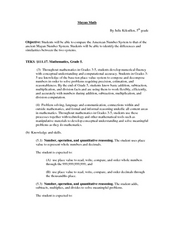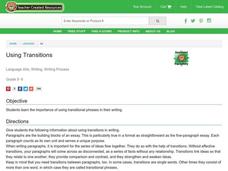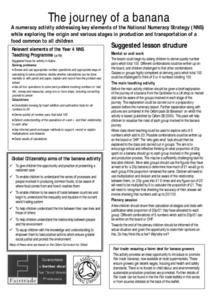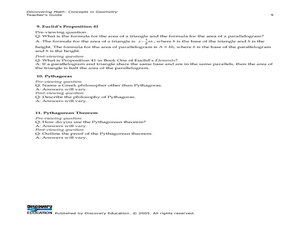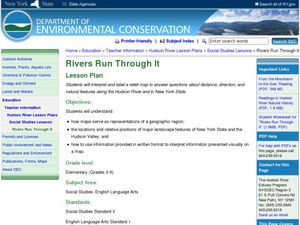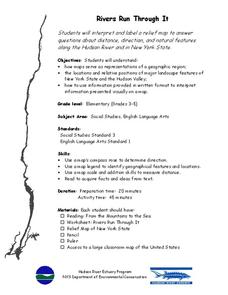Curated OER
Let's Dig Deeper!
Students investigate rocks and how they are formed and the uses man has for rocks. The topic is narrowed, researched, and documented by three sources. The results are presented to classmates for evaluation.
Curated OER
Mayan Math
Fifth graders investigate the Maya's as mathematicians. In this Mayan math lessons, 5th graders work with the ancient Mayan numbering system by comparing it to the American Number System. They tell the differences and similarities...
Curated OER
Basketball Notes
Students add the value of various musical notes to win a chance to shoot a basketball. They compete in teams and consider the values of quarter, half and whole notes to complete related math problems.
Curated OER
Students' Strides
Complete problems using base ten blocks to see the difference in the place value of a decimal and how it affects a number's value. Learners compare decimal values as well. Ample time for discussion and modeling are allowed in the...
Curated OER
A Brief History of Fairfax County
Learners brainstorm a list of things they already know about the history of Fairfax County, Virginia. After reading a primary source document, they discuss the similarities and differences between their prior knowledge and what they...
Curated OER
Using Transitions
Learners explore the importance of using transitional phrases in their writing. They discuss why transitions are important to their writing and various types of transitions that they can use. Students practice using transitions in their...
Curated OER
What can I do?
Students identify feelings and explore positive ways to handle conflict. In this mental health lesson students discuss feelings and how to constructively handle them.
Curated OER
Multiplying by 10, by 100, and by 1,000
Fourth graders write tenths and hundredths in decimal and fraction notations. In this math lesson plan, learners know the fraction and decimal equivalents for halves and fourths. Everyone answers numerous questions posed by the teacher...
Curated OER
Exploring the Hudson in 1609
While this lesson focuses on a study of the Hudson River, it could be used as a template for a discussion of map skills, converting measurements, and plotting a route. The lesson includes vocabulary and other resources to make it a...
Curated OER
Exploring the Hudson in 1609
Learners follow the journey of Henry Hudson down the river with his name. Using journal entries and maps, they learn about its exploration. They use maps to identify stages of the journey, and practice converting distances into miles.
Curated OER
Bud, Not Buddy: Anticipation Guide
Hoover flags? Hoover blankets? Hoovervilles? Drawing upon prior knowledge of the Great Depression class members respond to the prompts on an anticipation guide for Bud, Not Buddy, Christopher Paul Curtis’s tale of Bud Caldwell’s quest to...
Curated OER
Like Father, Like Son: Presidential Families
Students examine the role of the President. They discuss the President's responsibilities and compare both father/son presidents (Adams and Bush).
Curated OER
Children's Literature Across the Curriculum Ideas-Miss Spider's New Car
Students read Miss Spider's New Car by David Kirk. They complete a variety of cross-curricular activities surrounding the study of spiders. Included are reading, art, math, science, writing, social studies, and library connections.
Curated OER
The Journey of a Banana
To investigate the price of bananas in order to evaluate basic counting and number sense skills, your mathematicians focus upon multiplication and problem solving that incorporates social studies in the form of building awareness about...
Alabama Learning Exchange
Polygon Perimeters
What are polygons? Learners find the perimeter of various geometric figures that the teacher has drawn in chalk on the sidewalk. A worksheet to record their measurements is provided. Get your third graders outside and exploring the world...
Curated OER
Discovering Math: Concepts in Geometry
Middle and high schoolers explore the concept of proving the Pythagorean Theorem. They research proofs of the Pythagorean Theorem. Pupils create posters of proofs, and research Greek mathematicians.
Curated OER
Measure: Perimeter, Area and Volume
Students practice measuring with formulas. In this measurement lesson, students complete an activity that requires them to calculate perimeter, area, and volume.
Curated OER
Bugs, Bugs, Everywhere!
Students collect and compare bugs using magnifying lenses and graph data based on their comparisons. In this bugs lesson plan, students also make an aspirator by using a jar, tubing, and screen.
Curated OER
On the Trail of the Hudson's Migratory Fish
Using data related to the fish in the Hudson River area, learners calculate distance, elapsed time, and growth. They learn about migratory fish, the life cycle of a fish, analyze a map, and answer questions.
Curated OER
River Run Through It
With vocabulary lists, worksheets, and more, this lesson sets learners on an exploration of the Hudson River area. They read an essay about the area, analyze a relief map of New York State, and complete a worksheet.
Curated OER
Rivers Run Through It
Using a relief map of New York State, learners answer questions about the distance between different cities, identify bodies of water, and more. First, they discuss vocabulary related to the Hudson River area. Then, they complete a...
Curated OER
Why Be Active?
What are some of the benefits of physical activity? Young learners take a look at not just the physical benefits, but also the emotional and social benefits of being physically active. There is a heart rate activity to count their...
Channel Islands Film
Lone Woman of San Nicolas Island: Lesson Plan 3
Should researchers be able to excavate, examine, and remove Native American artifacts from historic sites? Should companies be permitted to build on sacred Native American land? After watching West of the West's documentary, The Lone...
Curated OER
All A-buzz About Math
Second graders participate in Math-Eze activities to comprehend word problems. In this word problem lesson, 2nd graders recognize why a hexagon is the best shape for a beehive. Students calculate how far bees must travel to find 2 lbs....
Other popular searches
- Memorizing Addition Facts
- Math Facts Addition
- Addition Facts Through 20
- Addition Facts to 18
- Addition Facts of Ten
- Three Digit Addition Facts
- Recalling Addition Facts
- Timed Addition Drills
- Double Facts in Addition
- All Addition Facts
- Addition Facts to 20
- Addition Facts Lesson Plans



